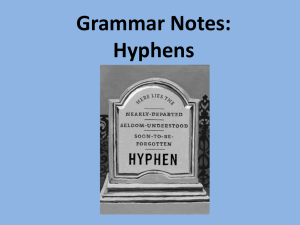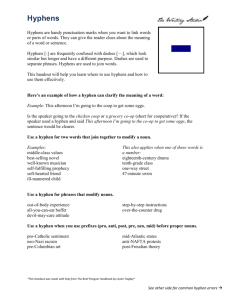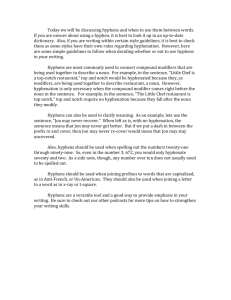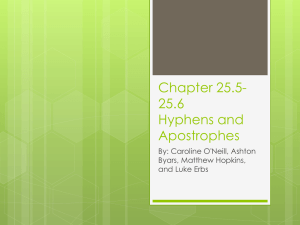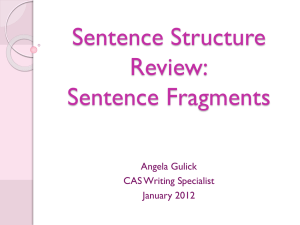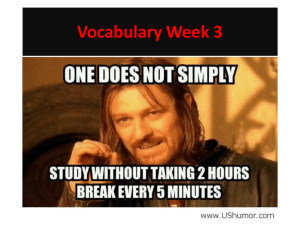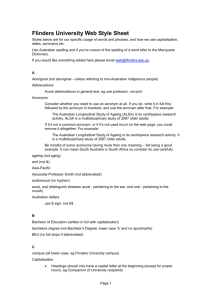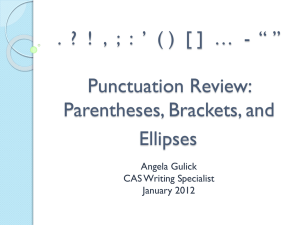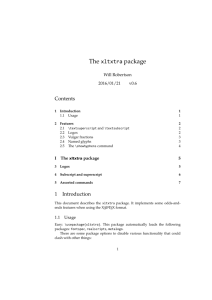Hyphens
advertisement
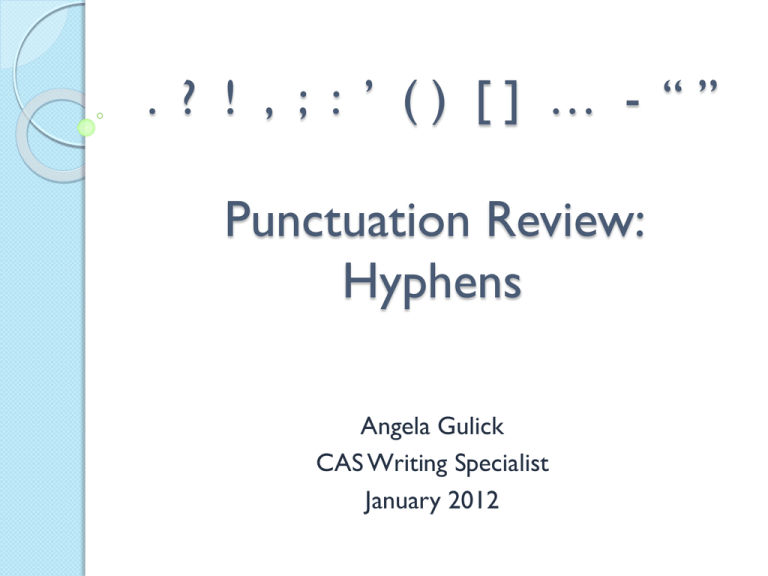
. ? ! , ; : ’ () [] … - “” Punctuation Review: Hyphens Angela Gulick CAS Writing Specialist January 2012 Introduction . ? ! , ; : ’ () [] … - “” This workshop provides a general overview that readers can go through at their own pace. The workshop does not cover every detail but focuses on the general rules associated with grammar, punctuation, and mechanics issues. A list of all Writing Lab handouts, PowerPoint workshops, and videos is available on the Center for Academic Success Resources page. A list of online exercises and additional sources is available at the end of this presentation. Copyright Angela Gulick, January 2012 Hyphens ----------------------- Hyphens (-) are used in several different ways: Use 1: Use a hyphen to connect or “stitch” words together that you want to be read as a unit. These words will form a single concept that describes the following word. However, if this description comes after the word it describes, do not use a hyphen. My eleven-year-old nephew got a new IPAD, and I am jealous! >>>In this case, I’m not saying my eleven nephew, my year nephew or my old nephew. I am saying my eleven-yearold (one concept) nephew. I need. My nephew who is eleven years old got a new IPAD, and I am jealous. >>>In this case, since the words describing the noun (nephew) come after the noun, no hyphen is Copyright Angela Gulick, January 2012 Hyphens ----------------------- Here is another example: My new 16-gallon fish tank exploded all over the floor last night. >>>In this case, I am not saying a 16 tank or a gallon tank. I am saying a 16-gallon (one concept) tank. My new fish tank that is 16 gallons exploded all over the floor last night. >>>In this case, since the words describing the noun (fish tank) come after the noun, no hyphen is needed. Copyright Angela Gulick, January 2012 Hyphens A quick caution about hyphens: Hyphens are used with adjectives and nouns, but they are not used with adverbs (words that describe or further define verbs). Even though the hyphen rule seems like it should apply here, it doesn’t because what is being described is the verb (the action), not the noun (the thing). The quickly moving train flew past the station, and only Denzel Washington could save the day! >> You don’t need a hyphen here between quickly and moving because quickly is describing the verb moving, not the noun train. My student’s hastily written research paper made me want to cry. >> You don’t need a hyphen here between hastily and written because hastily is describing the verb written, not the noun paper. Copyright Angela Gulick, January 2012 Hyphens ----------------------- Use 2. Use a hyphen to indicate a group of words that are always joined. Here are some examples: merry-go-round, editor-in-chief, mother-in-law. The best step here is to look up the words in the dictionary to see if they are separate words, words that are hyphenated, or one word. Some words come in a variety of forms. For example, consider these four sentences: I try to work out every other day, at least. >>> In this sentence, “work out” is used as a verb (an action). I had a really good workout this morning >>> In this sentence, “workout” is used as a noun (a thing). These are my favorite workout clothes and routines. >>> In this sentence, “workout” is used as an adjective (a word which further describes the words “clothes and routines.”) I hope that my husband and I can work out our problems. >>> In this sentence, “work out” is used as a verb (an action). Copyright Angela Gulick, January 2012 Hyphens ----------------------- Use 3. Use a hyphen to write out numbers and fractions. Use hyphens for all numbers from twenty-one through ninety-nine. >>> I can’t believe I spent seventy-five dollars on a new collar for my dog. Use hyphens for all spelled-out fractions. >>> One-third of all students who revise their assignments earn one letter grade higher for the entire class. >>> I asked my hair dresser to cut off one-half inch, but she measured incorrectly and cut off three-and-one-half inches. Copyright Angela Gulick, January 2012 Do You Still Have Questions? If you still have questions, please stop by the Writing Lab (D120) or check out our list of writing workshops on the CAS Resources page. Here are additional websites that can help you with grammar, punctuation, and mechanics issues. The first two links with ’s also have online exercises with answer keys to help you practice. Grammar Bytes Note: This site might require you to download a small program onto your computer the first time you use it. Guide to Grammar and Writing Purdue Online Writing Lab (OWL) Grammar Girl The Blue Book of Grammar Copyright Angela Gulick, January 2012
